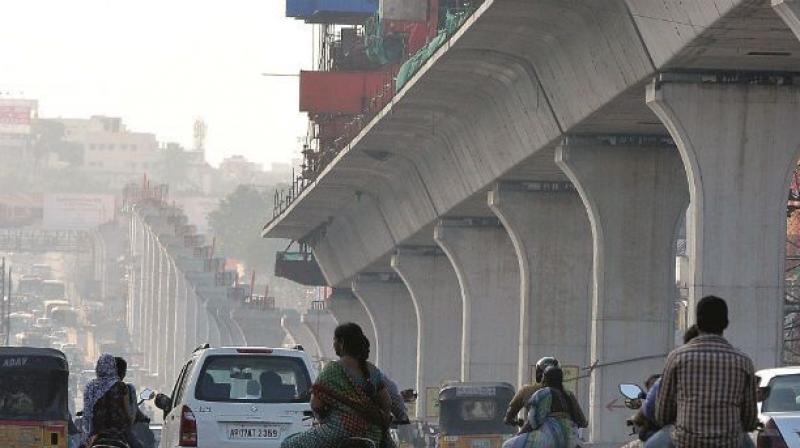Speed limit set near Hyderabad Metro Rail stations

Hyderabad: To keep traffic free-flowing and avoid accidents, the Hyderabad traffic police have set a speed limit of 20 kmph near Metro Rail stations such as Ameerpet, Rasoolpura, Paradise, and Secunderabad. The city’s average speed limit is 50 kmph. About 1,500 additional traffic cops will be deployed to Metro Rail stations to control traffic from 6 am to midnight. Each station will have about 15 cops at all times.
Signs indicating pedestrian crossings, U-turns and speed limits have been installed at Metro junctions. Senior traffic officials say that the biggest challenge will be the lack of parking spaces at Metro stations. The Metro Rail officials plan to provide facilities such as battery-operated cars and minibuses to ferry people to and fro from parking spots to ease the flow of traffic.
Dr V. Ravinder, the joint commissioner of police (traffic), says, “In our traffic study for the Hyderabad Metro Rail (HMR), it was found that there were three major challenges at the metro stations – pick-ups and drops, guiding pedestrians to bus-stops and auto-stands, and parking. The Metro Rail has prepared a street plan to overcome these challenges. The plan will be implemented at all Metro stations by the Metro Rail authorities. Traffic regulations will be included in the integrated Metro rail security plan.”
He says that the traffic police have suggested the installation of busstops near every Metro station, apart from the provision of auto-rickshaws, electric vehicles and private transport. “Cops will be deployed depending on the size of the station,” he said.
A senior official from the traffic department says, “Our main aim is to reduce vehicular traffic once the Metro Rail begins operations. Various traffic signs will be installed at the metro stations. There are plans to provide parking within a one km radius of each station. In Tarnaka, parking may be provided in the Railway Degree College campus. There is an open space near Habsiguda station and we are trying to encourage the development of private parking spaces.”
He adds that the HMR plans to employ six-seater battery-operated cars to drop commuters to bus-stops and colonies close to the stations. As per the traffic studies, the Metro Rail is expected to reduce traffic congestion in the city by 30 per cent.
The commuter load that will be taken over by the HMR will serve to reduce vehicular density, thus reducing the stress on the road and increasing the life of the existing road network.
N.V.S. Reddy, the Managing Director of the HMR, says, “About 1,000 people may get off each train. We will increase the frequency of trains to one every two minutes in the future, after the completion of other stretches and corridors. Our passenger traffic studies indicate that we can expect 2 lakh passengers on the two stretches. This number will go up to 3 lakh once feeder services are launched.”

